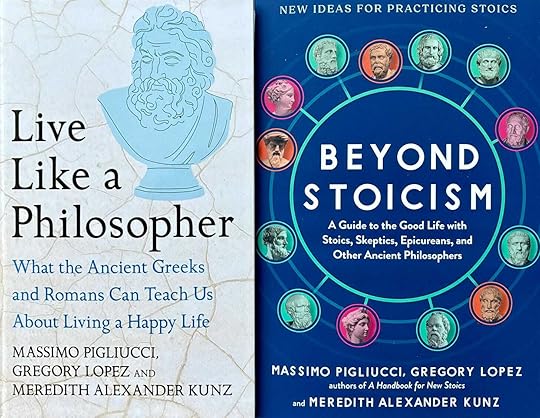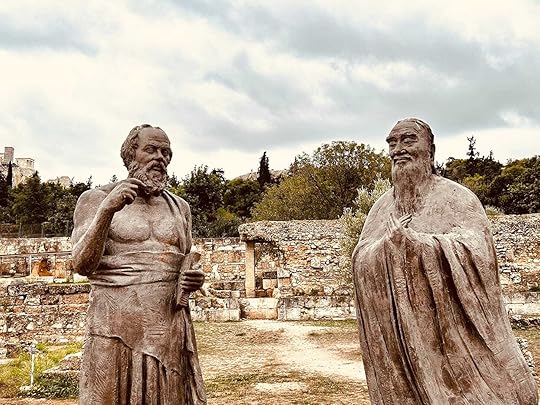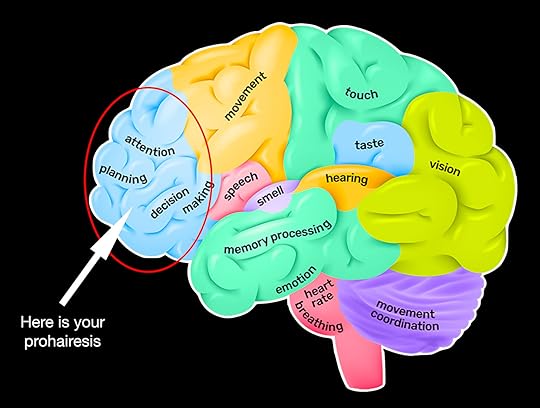Massimo Pigliucci's Blog, page 5
January 13, 2025
Practice like a Stoic: 42, Retreat to your inner citadel
 The inner citadel, by Midjourney.
The inner citadel, by Midjourney.[This series of posts is based on A Handbook for New Stoics—How to Thrive in a World out of Your Control, co-authored by yours truly and Greg Lopez. It is a collection of 52 exercises, which we propose reader try out one per week during a whole year, to actually live like a Stoic. In Europe/UK the book is published by Rider under the title Live Like A Stoic.Below is this week’s prompt and a brief explanation of the pertinent philosophical background. Check the bo...
January 10, 2025
Epicurus on justice and injustice
“The justice that seeks nature’s goal is a utilitarian pledge of men not to harm each other or be harmed.
Nothing is either just or unjust in the eyes of those animals that have been unable to make agreements not to harm each other or be harmed. …
Justice was never an entity in itself. It is a kind of agreement not to harm or be harmed.
It is impossible for a person who underhandedly breaks the agreement not to harm or be harmed to feel sure that he will escape punishment, even though he manages to...
January 8, 2025
Video: Beyond Stoicism
 The UK (left) and US (right) editions of the new book by Massimo Pigliucci, Gregory Lopez, and Meredith Kunz.
The UK (left) and US (right) editions of the new book by Massimo Pigliucci, Gregory Lopez, and Meredith Kunz.Welcome to another entry in our occasional series of video chats with authors and translators who have written about the philosophy, culture, and history of the Greco-Roman tradition.
This is a bit of a special episode, as instead of me interviewing a book author it is my friend Gregory Sadler who facilitates a discussion between Greg Lopez, Meredith Kunz, and yours truly about the new boo...
January 6, 2025
Practice like a Stoic: 41, Question judgments around pain and disease
 A thoughtful Roman soldier according to Midjourney.
A thoughtful Roman soldier according to Midjourney.[This series of posts is based on A Handbook for New Stoics—How to Thrive in a World out of Your Control, co-authored by yours truly and Greg Lopez. It is a collection of 52 exercises, which we propose reader try out one per week during a whole year, to actually live like a Stoic. In Europe/UK the book is published by Rider under the title Live Like A Stoic.Below is this week’s prompt and a brief explanation of the pertinent philosophical backgr...
January 3, 2025
Epicurus on friendship
“Of all the things that wisdom provides for the happiness of the whole man, by far the most important is the acquisition of friendship.
It is the same judgment that has made us feel confident that nothing fearful is of long duration or everlasting, and that has seen personal security during our limited span of life most nearly perfected by friendship.”
(Leading Doctrines, 27-28)
The Philosophy Garden: Stoicism and Beyond is a reader-supported publication. To receive new posts and support my work, c...
January 1, 2025
The Socratic view of the world
 Socrates and Confucius, two of humanity’s sages, amiably conversing in the Athenian agora, just below the Acropolis. Photo by the Author.
Socrates and Confucius, two of humanity’s sages, amiably conversing in the Athenian agora, just below the Acropolis. Photo by the Author.Summary: Socrates, the ancient Greek philosopher, revolutionized Western philosophy by emphasizing the examination of life, morals, and good and evil. His method of questioning and seeking precise definitions challenged societal norms and encouraged critical thinking. Despite never writing anything down, Socrates’s influence lives on through his students, parti...
December 30, 2024
Practice like a Stoic: 40, Focus on the mind-body connection
 Modified from an image at qbi.uq.edu.au
Modified from an image at qbi.uq.edu.au[This series of posts is based on A Handbook for New Stoics—How to Thrive in a World out of Your Control, co-authored by yours truly and Greg Lopez. It is a collection of 52 exercises, which we propose reader try out one per week during a whole year, to actually live like a Stoic. In Europe/UK the book is published by Rider under the title Live Like A Stoic.Below is this week’s prompt and a brief explanation of the pertinent philosophical background. Check ...
December 27, 2024
Epicurus on the importance of sense perception
“It is necessary to take into account both the actual goal of life and the whole body of clear and distinct perceptions to which we refer our judgments. If we fail to do this, everything will be in disorder and confusion.
If you reject all sensations, you will not have any point of reference by which to judge even the ones you claim are false. …
If at any time you fail to refer each of your acts to nature’s standard, and turn off instead in some other direction when making a choice to avoid or pur...
December 23, 2024
Practice like a Stoic: 39, Keep basic Stoic concepts always at hand
 Bolinus brandaris, the mollusk from which the Greco-Romans extracted their purple die. Image from Wikimedia, CC license.
Bolinus brandaris, the mollusk from which the Greco-Romans extracted their purple die. Image from Wikimedia, CC license.[This series of posts is based on A Handbook for New Stoics—How to Thrive in a World out of Your Control, co-authored by yours truly and Greg Lopez. It is a collection of 52 exercises, which we propose reader try out one per week during a whole year, to actually live like a Stoic. In Europe/UK the book is published by Rider under the title Live Like A Stoic.Below is this week’s...
December 20, 2024
Epicurus on the limits of true pleasure
“Bodily pleasure is not enlarged once the pains brought on by need have been done away with; it is only diversified. And the limit of mental pleasure is established by rational reflection on pleasures themselves and those kindred emotions that once instilled extreme fear in human minds.
Infinite time contains no greater pleasure than does finite time, if one determines the limits of pleasure rationally. …
One who understands the limits of the good life knows that what eliminates the pains brought ...



